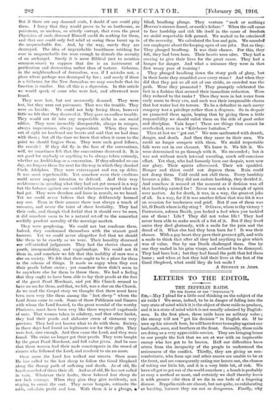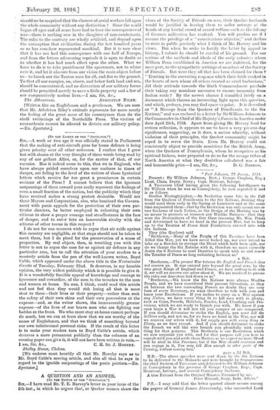LETTERS TO THE EDITOR.
THE ZEPPELIN RAIDS.
[TO THE EDITOR OP MR " SPECTATOR."1 SIR,—May I plead for a little cool thinking on the subject of the air raids ? We seem, indeed, to be in danger of falling into the very state of mind which it is the object of these raids to produce, and it is a state of mind which is not usually admired by English- men. In the first place, these raids have no military value ; the enemy will not " get his decision " in English air. If he uses up his aircraft here, he will have fewer to employ against our husbands, sons, and brothers at the front. Secondly, these raids aro doing us a very appreciable service. They are bringing home to our people the fact that we are at war with an implacable enemy who has got to bo beaten. Half our difficulties have arisen from the incapacity of the people to understand the seriousness of the conflict. Thirdly, they are giving us non- combatants, who from age and other causes are unable to be at the front, and are consequently eating our hearts out, the chance of taking our little bit, and it is a very little bit, of risk. We have all got to get out of the world somehow ; a bomb is probably as easy a method as most, and certainly we shall thereby leave it with greater mclat than if we die in our beds of a lingering disease. Zeppelin raids arc almost, but not quite, as exhilarating as hurting, hseause they are not so dangerous. Finally, why should we be surprised that the chances of aerial warfare fall upon the whole community without any distinction ? Since the world began all ages and all sexes have had to bear the.eonsequeneed of War—there is nothing new in the slaughter of non,combatants. Trio rules to the contrary are wholly artificial, and depend upon the assumption that civilization during the last hundred years or so has somehow regenerated mankind. But it is now clear that it has not had this consequence with one half of Europe, and from the letters advocating reprisals it is open to doubt. as to whether it has had much effect upon the other. What we haVe to do is to take punishment like sportsmen, not to whine over it, and let it obscure from our vision the main object before us—to knock out the Teuton once for all, and flat to the ground. To that all our energies, on, above, and below both land and sea, should be concentrated, and no distraction of our military forces should be permitted merely to save a little property and a few of our comparatively useless lives.—I am, Sir, &c.,
[Written like an Englishman and a gentleman. We are sure that Mr. Athelstan Riley's attitude represents far more nearly the feeling of the great mass of his countrymen than do the shrill twitterings of the Northcliffe Press. The victims of neurasthenia cannot be allowed to dictate our military policy. —En. Spectator.]



































 Previous page
Previous page